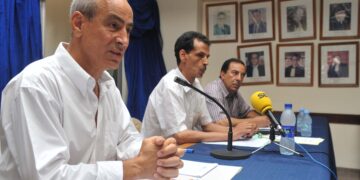Judge Awadh al-Ahmari has been implicated in the detention, torture, and extraction of forced confessions of peaceful human rights activists during his time as a detective in the State Security Circuit within the Public Prosecution Office from 2010 to 2022 according to witnesses who spoke to Democracy for the Arab World Now (DAWN).
A loyal associate of Saudi Crown Prince Mohammed bin Salman (MBS), al-Ahmari also was part of the delegation accompanying the Saudi Attorney General to Istanbul in October 2018, which was apparently dispatched to clean up evidence of Jamal Khashoggi's assassination and dismembering at the Saudi Consulate, according to the UN Special Rapporteur on Extra-Judicial, Summary or Arbitrary Executions. On June 9, a royal order appointed Al-Ahmari to head the Specialized Criminal Court, the country's terrorism court, despite the fact that he has no judicial training.
"For his loyal service delivering forced confessions, torture, and coverups, Awadh al-Ahmari was rewarded handsomely by Mohamed bin Salman with a job to head the most notorious court used to persecute peaceful political activists," said Abdullah Alaoudh, Gulf Director at DAWN. "MBS has dispatched al-Ahmari to silence critics and clean-up his messes, including the murder of Jamal Khashoggi in Istanbul."
Abuses:
Al-Ahmari is complicit in the torture, extraction of forced confessions, and detention of peaceful human rights activists. One source close to a prominent Saudi human rights defender, whom DAWN is not naming to protect them from government retaliation, told DAWN on September 7, 2022 that al-Ahmari interrogated their family members in 2013 about their peaceful activism and extracted forced confessions from them. As a result, the activist was sentenced to very long imprisonment and suffered permanent damage to his body. Another source, a prisoner of conscience whom DAWN is also not naming for safety reasons, told DAWN on October 12, 2022 that al-Ahmari interrogated him in 2014 about videos he posted to YouTube and forced him to sign a confession that he was an "extremist" and "terrorist." When the prisoner retracted his confession in court, he said that al-Ahmari locked him in solitary confinement for months, a form of torture, until he confessed again under threats from al-Ahmari. He said that al-Ahmari dictated his confession verbatim and then coerced him to sign it. As a result, he was sentenced to and served a few years in prison.
Al-Ahmari also was involved in the cover-up of the Khashoggi murder in Istanbul, traveling in 2018 with Attorney General Saud al-Mojeb to the Saudi Consulate there ostensibly to investigate the murder. But according to the report of the United Nations' Special Rapporteur on Extrajudicial, Summary or Arbitrary Executions, the Saudi delegation helped clean up evidence of the crime, preventing Turkish authorities from investigating the premises, and providing false information to the public about what had transpired. Attorney General al-Mojeb decided not to indict the crown prince's right-hand man, Saud al-Qahtani, even though he was identified by the U.N. and the U.S. Office of Director of National Intelligence as the mastermind of the operation. The Saudi prosecutors also gave contradictory statements about the murder and failed to investigate the location of Khashoggi's remains.
Appointment to Head Terrorism Court:
A royal decree obtained by DAWN through a judicial source issued on June 9, 2022 announced the appointment of al-Ahmari and at least ten other detectives and prosecutors to serve as judges in the Specialized Criminal Court. Many of the appointees do not possess the minimum qualifications stipulated by Saudi laws to hold their newly assigned roles (Art. 31 of the Saudi Judicial Regulation). Typically judges must complete at least two years of judicial training and studies at the High Judicial Institute, in addition to obtaining a bachelor's degree in law or its equivalent. Al-Ahmari did not acquire these and did not go through the channels of judgeship typically followed in the country like the two years training and clerking for a judge, according to a judge whom DAWN spoke to on October 14, 2022. He said he has direct knowledge of Al-Ahmari's educational background.
The appointments by royal decree followed the purge of at least nine sitting judges in the SCC Court, the terrorism appeals court, and the High Court by the State Security Agency, which arrested them on April 11, 2022 and charged them with treason. There is no information on whether these judges are being prosecuted. Following the purge and new appointments, the SCC issued several extreme prison sentences, overturning much shorter sentences issued by lower courts, including sentencing two Saudi women to 34 and 45 years in prison, respectively, for their use of social media.
Al-Ahmari and the other newly appointed judges have close ties to the Saudi Royal Court and MBS, according to a senior official in the Saudi judiciary interviewed by DAWN on August 20, 2022. The source also confirmed that al-Ahmari and other recently appointed judges previously worked in the State Security Circuit within the Public Prosecution Office, which has been responsible for harassing, interrogating and prosecuting social critics in the country.
"By appointing al-Ahmari to reside over the Specialized Criminal Court (SCC), MBS is signaling to Saudis that only those willing to do his dirty work will be rewarded with promotions despite lacking qualifications. At the same time, he is sending a message to the world that he has no desire to end his brutality," said Sarah Leah Whitson, Executive Director of DAWN. "Al-Ahmari should be exposed for his crimes and violations as the sanctions against human rights violators like Khashoggi Ban and Magnitsky Act are designed for people like him."
DAWN has repeatedly called for Saudi culprits, including judges, to be held responsible for their roles in enabling state repression against Saudi citizens including human rights defenders, civil society leaders, democracy reformers, and religious minorities. For judges, this includes accountability for denying these individuals their fundamental due process rights during trial, upholding convictions based on insufficient evidence, and applying extreme prison sentences.
DAWN urges the United States to sanction Judge al-Ahmari for his role in the torture, detention, and forced confession of political activists. DAWN also urges the United States to end arms sales and military support to the Kingdom, in light of the country's widespread and systematic human rights abuses. Section 502B of the Foreign Assistance Act prohibits arms sales to governments with a record of gross violations of human rights.
DAWN requested a response from Mr. al-Ahmari on October 28, 2022, but no response was received by the time of publication.
***
Tweet the Saudi Ministry of Justice here, and the Saudi Embassy in Washington DC here. Tell them to stop prosecuting peaceful dissidents.
**
About DAWN's culprit gallery:
Tyrants need enablers who will implement their oppressive practices, even if it means abusing their fellow citizens. These agents often mask their complicity in the guise of professionals exercising their duties in offices, courtrooms, police stations, and interrogation rooms.
DAWN seeks to disclose the identity of the state agents who enable repression and to make them recognizable at home and abroad. These individuals, whom DAWN calls "culprits," bear administrative, civil, moral, legal, and/or political responsibility for human rights abuses or international humanitarian law violations.







































